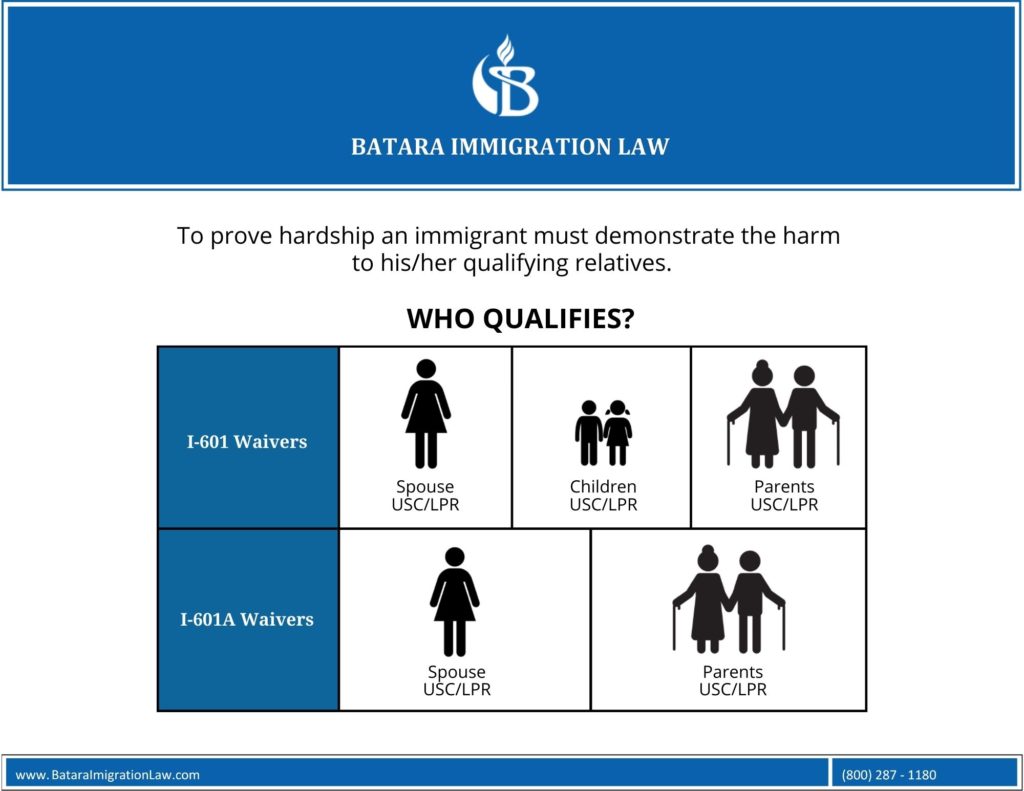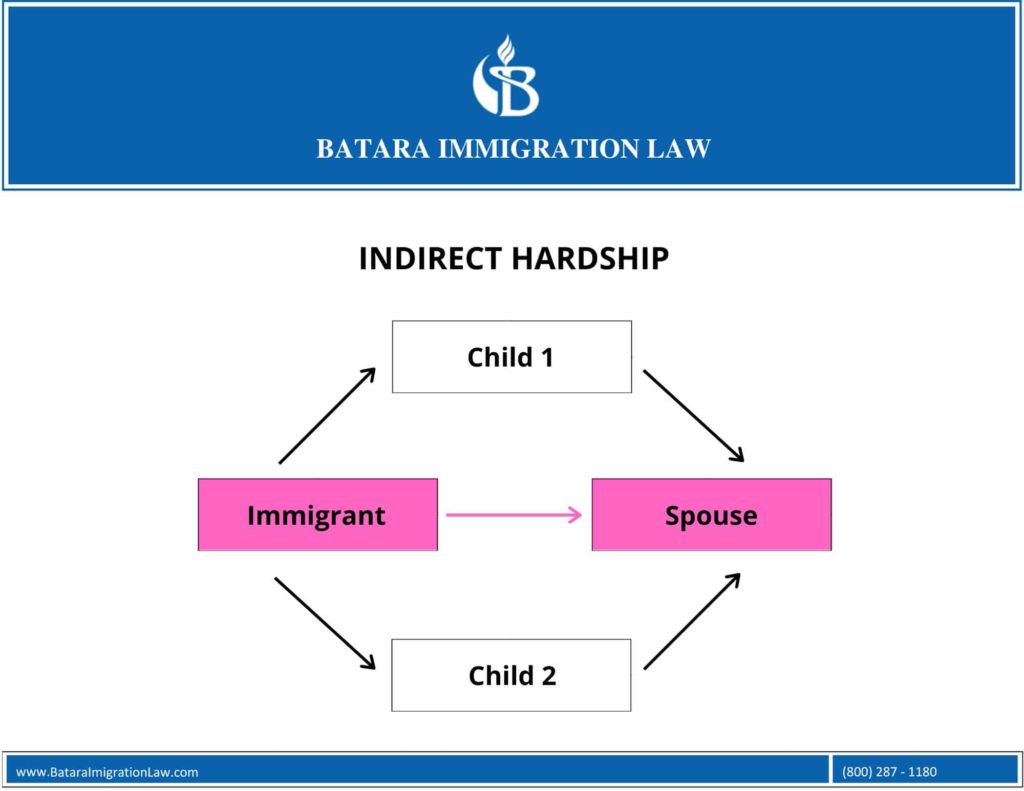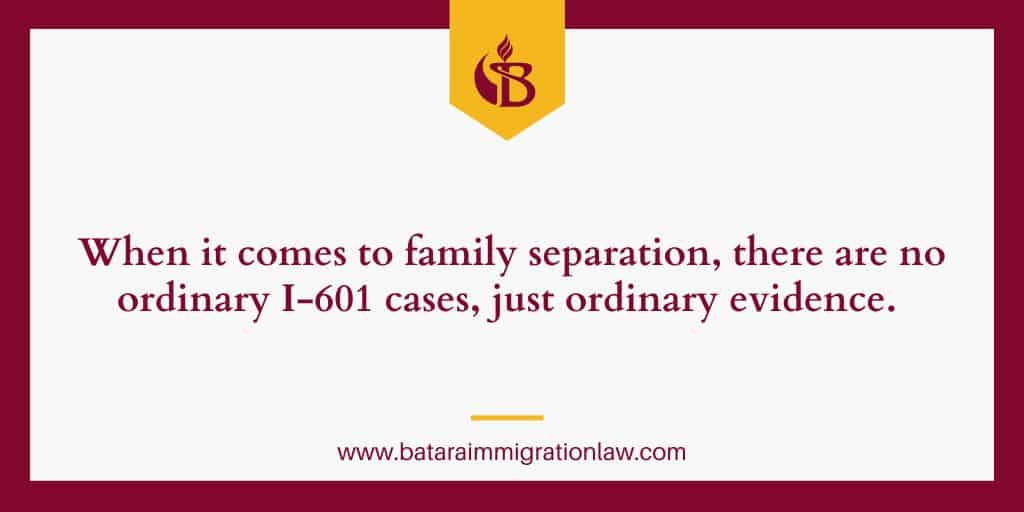
If at first you don’t succeed, I was taught by my mother, try and try again.
This attitude is one of the most important mindsets for many U.S. spouses trying to help immigrate their spouses born in another country.
Especially those who need to win a hardship waiver to remain together as a family.
I’ve seen far too many couples set out thinking the green card process is simple, only to find themselves facing separation from each other for 3 years, 10 years, and longer.
Giving up is not an option.
This article will guide you through one of the most essential components for victory: ensuring the suffering and losses of your qualified relatives are fully disclosed to the government.
Table Of Contents
- Why Immigrants Need I-601 Waivers
- Who Is A Qualifying Relative?
- Two Different Waivers Of Inadmissibility Based On Qualifying Relatives: I-601 And I-601A
- What Are Differences Between An I-601 Waiver And An I-601A Waiver?
- What Is Hardship To I-601/I-601A Qualifying Relatives For Family Unity Waivers?
- How Indirect Factors Of Hardship And Non-Qualifying Relatives Win Waivers
- The Subjective Nature Of I-601 Extreme Hardship Waivers
- Does A Qualifying Relative Need To Be The Same Person As Your I-130 Petitioner?
- Why I-601 And I-601A Cases Fail
Why Immigrants Need I-601 Waivers
In most I-601 waiver cases, immigrants who entered the United States without inspection are required to return to their home countries for permanent residence interviews (unless they qualify under a narrow group of exceptions, allowing them to be interviewed at a local immigration office).
If they have lived in the U.S. for 180 days without permission, once they leave the United States, they are deemed inadmissible for a period of three years. This is referred to as a three-year bar to re-entry.
If they have lived here for one year without permission, then depart, however temporary, they are subject to a ten-year bar to re-entry.
These are called inadmissibility bars.
This is where applications for a waiver of inadmissibility come into play.
If granted, a waiver forgives an immigrant’s transgression and grants admission to the United States.
To succeed, waiver requests must establish that a qualifying relative will suffer extreme hardship if the immigrant is not allowed to return to the U.S.
Who Is A Qualifying Relative?
A qualifying relative is a specific United States citizen or permanent resident relative of the immigrant who seeks a family unity waiver to re-enter the United States after their consular processing interview abroad.
To qualify for family unity waiver, immigration officers review whether qualifying relatives will suffer an extreme hardship if their immigrant relative is not allowed to legally return to the U.S.
If the government does not find extreme hardship to the specified family members, the immigrant’s waiver application will be denied.

Two Different Waivers Of Inadmissibility Based On Qualifying Relatives:
I-601 And I-601A
Sometimes U.S. citizens arrive at my office because their immigration spouse attended a permanent residence interview in their home country, but learn they cannot return. They learn that the immigrant needed an approved I-601 waiver to re-enter the U.S.
Other times, the couple contacts me after they have filed a waiver application, planning to attend an interview abroad. Their interview has not yet been scheduled. They receive a Request For Evidence, seeking additional proof the immigrant spouse deserves a I-601A waiver in the government’s discretion.
In both situations, their marriage is in jeopardy.
What Are Differences Between An I-601 Waiver And An I-601A Waiver?
Clients are often confused because there are two different I-601 waiver applications.
Both are used by immigrants hoping to overcome their inadmissibility to the United States. If granted, both grant “forgiveness” of an permanent resident applicant who has lived here without proper permission.
The I-601 is entitled Application For Waiver Of Grounds Of Inadmissibility. The I-601A is entitled Application For Provisional Unlawful Presence Waiver.
Although the two waivers are fairly similar, there are significant differences.
First, the location of the applicant.
Form I-601 is primarily used by immigrants who are outside the U.S. Form I-601A is filed by those inside the U.S.
A little history is in order.
The I-601A waiver was a product of the Obama Adminstration. The goal was to promote family unity by reducing the amount of time immigrants were separated from their United States families waiting for a decision on their waiver applications.
Before this change, immigrants would have to travel to their home countries. Once they were abroad, they could submit their I-601 waivers. Most would have to wait several months before they would receive a decision, sometimes as long as 12 -18 months.
With the new I-601A process, immigrants were allowed to file their waiver applications while remaining in the U.S. After a decision is rendered, they can then schedule their interviews at a consulate office in their home country.
Second, the I-601 waiver is broader.
The 601-A waiver pertains to only the 3 year and 10 year inadmissibility bans based on how long an immigrant resided in the United States without permission.
Note its’ title: Application For Provisional Unlawful Presence Waiver. It only forgives the period of unlawful presence. It is never filed by an immigrant residing outside the U.S.
The 601 waiver is used not only to waive unlawful presence in the United States, but also other issues that can lead the government to deny permanent residency. These include health issues, criminal problems, immigration fraud, and national security concerns.
Again, the title is instructive: Application For Waiver Of Grounds Of Inadmissibility. It covers a broader range of inadmissibility problems.
In addition, it should be noted that the I-601 waiver is also sometimes filed by immigrants who are residing inside the United States. This is because they need a waiver for issues beyond just unlawful presence.
In order to overcome inadmissibility due to unlawfully residing in the U.S., immigrants who are undocumented or who overstayed their visa must prove the separation will impose an extreme hardship upon their qualifying relatives. This is the same under either waiver.
The process for an I-601 waiver is slightly different for inadmissibility decisions based on grounds other than unlawful presence. Immigration officials evaluate the circumstances for inadmissibility and weigh them against the hardship to qualifying relatives that will be suffered because of the residency denial.
Third, qualifying relatives.
Whenever new immigration regulations are implemented, there are trade-offs. In return for allowing immigrants living in the U.S. to file for an I-601 waiver without having to leave the country, the Obama Administration limited who counts as qualifying relatives.
For I-601 waivers, a qualifying relative is a U.S citizen or permanent resident spouse, parent, or child of the immigrant who seeks a family unity waiver to re-enter the United States after their consular processing interview abroad.
However, as the graph above shows, for I-601A waivers, a qualifying relative only includes a U.S citizen or permanent resident spouse or parent of the immigrant who seeks a family unity waiver to re-enter the United States after their consular processing interview abroad.
The children of the immigrant, whether U.S. citizens or permanent residents, do not count as qualifying relatives for purposes of seeking a waiver of inadmissibility based on unlawful presence.
This exclusion is crucial for waiver-seeking immigrants and their families to understand. In this article, I will discuss how to work around this constraint to ensure all hardship factors are weighed by government officers in I-601A cases.
Such flawed trade-offs constituted a missed opportunity by the Obama Administration to create a truly beneficial waiver process for undocumented immigrants and their U.S. relatives.
In short, it’s crucial you know your qualifying relatives.
You have to know whom you’re building your waiver case around, because your evidence must focus on the hardship of your I-601 qualifying relatives.
What Is Hardship To I-601/I-601A Qualifying Relatives For Family Unity Waivers?
As a Riverside immigration lawyer, helping clients understand the concept of extreme hardship is critically important to their defense against family separation.
Yet, hardship is perhaps the most difficult immigration concept to learn and master.
But mastering it is absolutely necessary.
Let’s get started.
In general, there are two parts to an extreme hardship determination.
The first prong of I-601 decision-making is objective.
USCIS begins its assessment based on the evidence presented. What information has been given to the agency to prove how an immigrant’s inability to return to the U.S. will affect his or her qualifying relatives?
To a large extent, this part of the process is based on the quality of the documentation.
There are a wide variety of personalized hardship factors which should be evaluated by adjudicators under a totality of the circumstances approach to making I-601 decisions:
One such approach is 8 C.F.R. 1240.58 which set forth a list of factors pertinent to an evaluation of extreme hardship under the former suspension of deportation standard developed by immigration courts.
- The age of the alien, both at the time of entry to the United States and at the time of application for suspension of deportation;
- The age, number, and immigration status of the alien’s children and their ability to speak the native language and to adjust to life in the country of return;
- The health condition of the alien or the alien’s children, spouse, or parents and the availability of any required medical treatment in the country to which the alien would be returned;
- The alien’s ability to obtain employment in the country to which the alien would be returned;
- Length of residence in the United States;
- Existence of other family members who are or will be legally residing in the United States;
- Financial impact of the alien’s departure;
- Impact of a disruption of educational opportunities;
- Psychological impact of the alien’s deportation;
- Current political and economic conditions in the country to which the alien would be returned;
- Family and other ties to the country to which the alien would be returned;
- Contributions to and ties to a community in the United States, including the degree of integration into society;
- Immigration history, including authorized residence in the United States;
- The availability of other means of adjusting to permanent resident status.
Because government officers are required to consider the totality of circumstances, this list is not exhaustive.
Click here for more information on how to prepare, organize, and present evidence to support your hardship application.
How Indirect Factors Of Hardship And Non-Qualifying Relatives Win Waivers
One shortcoming of the list above is that immigrants seeking relief are excluded from the definition of I-601 qualifying relatives.
Not so fast.
As the USCIS guidelines point out, an applicant’s condition and prospective situation may show that denial of his admission would have a significant emotional or financial impact on one or more qualifying relatives in the United States.
In such cases, the USCIS officer may consider such impacts when determining whether the qualifying relative would experience extreme hardship upon the denial of admission to the immigrant.
Moreover, even hardship to other non-qualifying relatives may be relevant.
Consider the role of children in I-601A waiver applications. They are not considered qualifying relatives.
Does this mean applicants should ignore the hardships that will fall upon them due to separation from their parent?
Of course not.
But the hardships of the children, in such cases, must be linked to a qualifying relative – in most cases, to the hardship of their qualifying relative parent.

According to the government, if an I-601 applicant claims hardship to an individual who is not a qualifying relative for purposes of the relevant waiver, the officer should consider the alleged hardship only as it affects one or more qualifying relatives.
To use the example above, Jessica, a 10 year-old child, is not a qualifying relative for I-601 purposes.
Thus, at first glance, the hardship she will suffer because of separation from her immigrant mother, Jasmin, does not count as a direct factor of the suffering her U.S. citizen father will experience.
Yet, if her hardship will adversely impact the life of her father, who is a qualifying relative, it is an indirect factor to be assessed by USCIS.
In other words, statutory hardship boundaries are not absolute.
And in the vast majority of waiver cases, the inclusion of hardship to non-qualifying relatives as indirect factors of hardship to qualifying relatives is crucial to victory.
On the one hand, this strategy is essential in I-601A matters since children are absent from the list of qualifying relatives.
On the other, in many I-601 and I-601A cases, the impact of family separation on various relatives – such as the parents of the U.S. spouse and elderly grandparents of either the immigrant or U.S. spouse – should be explored.
Likewise, the indirect hardships to siblings, close friends, and extended family members is often relevant for successful waiver applications.
Further, the law may have stripped officers from weighing the adverse effects on an immigrant facing separation from family and community ties, from the loss of upward employment mobility, and from the removal of educational opportunities.
Nonetheless, as I’ve witnessed in most close families, these types of hardship factors do have detrimental ramifications on qualifying relatives who stand to lose the love, support, and presence of a immigrant husband, mother, father, or child.
Hence, if presented properly, USCIS agents must consider such indirect hardship factors, involving non-qualifying relatives, in family unity waiver evaluations.
The Subjective Nature Of I-601 Extreme Hardship Waivers
The second prong of I-601 decision-making is subjective.
Given that these determinations are discretionary, one adjudicator may perceive that an extreme hardship exists in a particular situation which a different officer would rule to the contrary.
Simply stated, how is the evidence weighed?
Commentators have long recognized the reason some immigrants fall short of proving hardship is not due to substantive considerations. Rather, these decisions turn on evidentiary considerations.
In other words, some cases are lost due to insufficient evidence. Other immigrants fail as a result of the weighting process.
Because the evaluation process lacks precise parameters, what one adjudicator thinks is an extreme hardship, another adjudicator might perceive as an ordinary hardship.
This decision-making reality should not be viewed as sinister.
But the process of navigating inadmissibility waivers must be carefully handled to ensure your success.
The evaluation of hardship has always been subjective, even under the old suspension of deportation standard.
For instance, as the Board of Immigration Appeals long ago stressed, absent a showing of significant or actual potential injury substantially different and more severe than that suffered by the ordinary alien who is deported, an extreme hardship will not be found.
Not much guidance there.
Still, there is an important point to be realized.
Under an extreme hardship formula, only two degrees of hardship exist: ordinary and extreme.
Although simplistic, this approach makes it easy for immigrants to grasp how their cases will be assessed.
Ordinary hardship, defeat.
Extreme hardship, victory.
As a immigration lawyer, I’ve learned the key to winning an extreme hardship argument in the context of I-601 and I-601A waivers is to support the application with good evidence.
By strengthening the objective evidence backing waiver requests, immigrants can reduce the possibility that an extreme hardship will be mistaken for an ordinary hardship.
Does A Qualifying Relative Need To Be The Same Person As Your I-130 Petitioner?
Before closing, here is another tip you should know.
The petitioner for an immigrant seeking a green card and a qualifying relative for hardship purposes do not need to be the same person.
Many immigrants and their family relatives get tripped up on this issue.
In other words, immigrants can proceed with the two-step green card process by filing a waiver application of a third person.
Here’s an example.
Zachary, a U.S. citizen, recently turned 21. He wants to file an I-130 family visa petition and immigrate his mother.
Since her mother, Leticia, entered the U.S. without inspection, she has to return to her home country for the green card interview.
But due to living here a long time, Leticia will need to win an I-601A waiver to re-enter the country. This means she needs to demonstrate extreme hardship to a qualifying relative.
As Leticia’s son, Zachary is not an I-601A qualifying relative.
Only spouses and parents who are U.S. citizens or lawful permanent residents are qualifying relatives for family unity hardship purposes.
However, Leticia’s mother is a permanent resident. She is a qualifying relative.
If Leticia can prove that her mother will suffer an extreme hardship, Leticia will be granted a waiver. Once her permanent resident application, based on Zachary’s I-130 petition, is approved, she will allowed to return to the United States.
On the other hand, if her mother was deceased, and both her husband and father lacked legal immigration status, she is out of luck. She would not be eligible for a waiver, despite the approved family-based petition filed by her son.

Why I-601 And I-601A Cases Fail
In my view, when it comes to family separation, there are no ordinary I-601 or I-601A cases.
The main cause for defeat in such matters is that only ordinary evidence is submitted for USCIS review. Deficiencies usually start with a short-sighted view of hardship.
For this reason, as I noted earlier, it’s crucial you know your qualifying relatives.
The ability to preserve family unification is dependent upon highlighting the losses and suffering of specified family members .
To be blunt, the predominant key to success is the quality of materials and documents you provide the government for review. This, in turn, requires understanding which relative’s trails and tribulations to emphasize.
You must focus on your qualifying relatives and firmly demonstrate their direct and indirect hardships.
Both I-601 and I-601A victory demands nothing less.
By Carlos Batara, Immigration Law, Policy, And Politics




